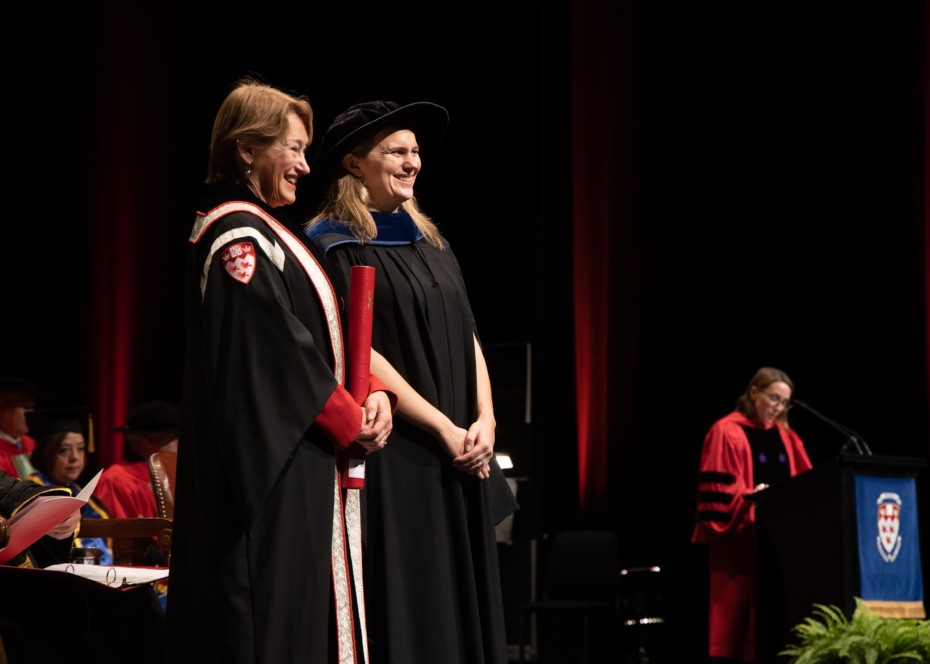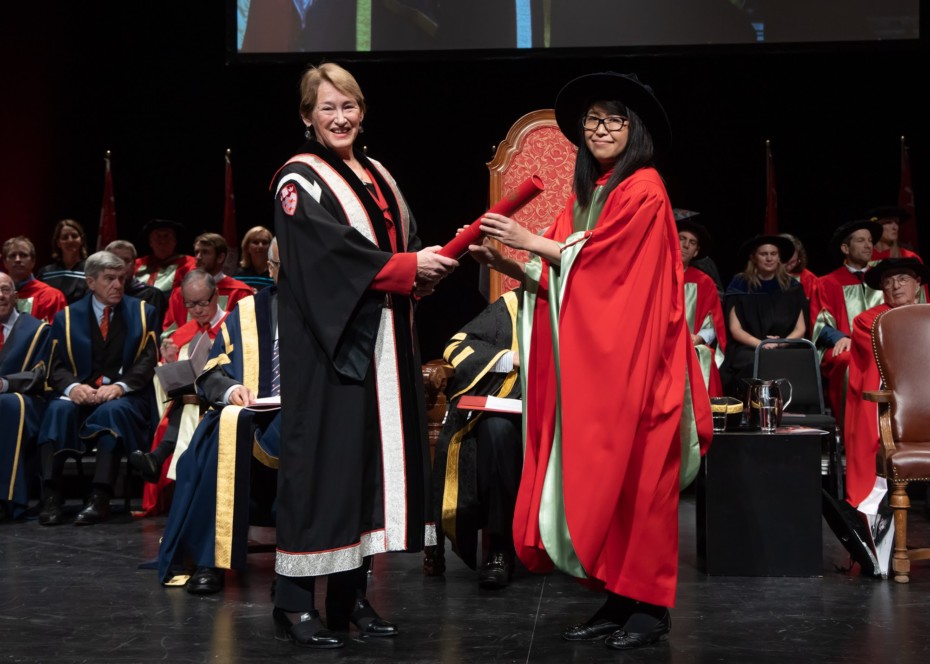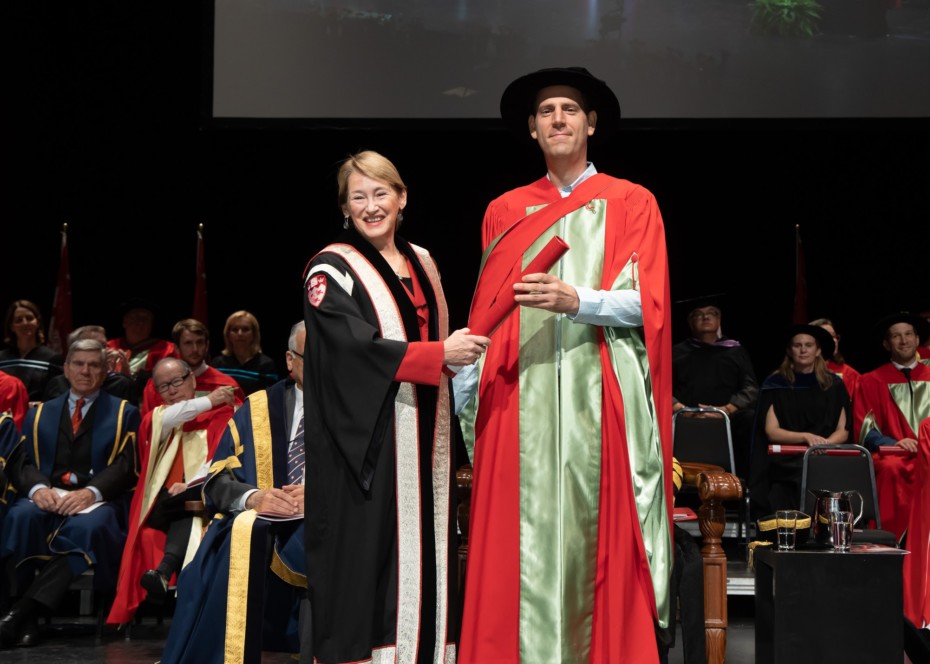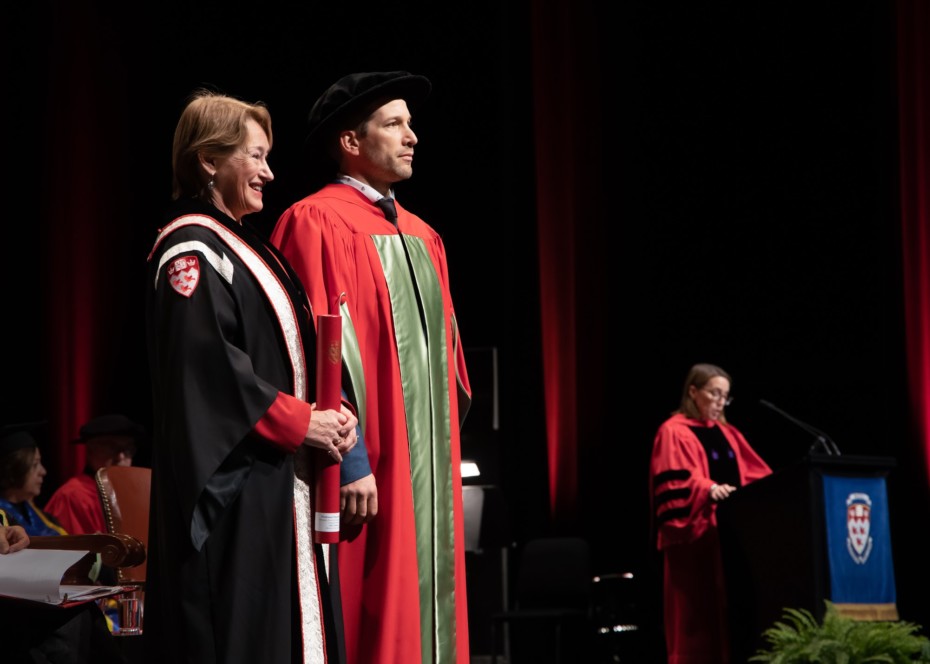
Manuel Balán’s recollections of his first day teaching are vivid.
“I remember well how nervous I was… my heart racing, the nightmares the night before (going to the wrong classroom, being late, blanking in the middle of a lecture),” says Balán, who is jointly appointed in the Department of Political Science and the Institute for the Study of International Development. “I think all of these things still happen to me, especially at the beginning of the term, but they are all far less intense now.”
Balán was one of four winners of a Principal’s Prize for Excellence in Teaching as handed out during Fall Convocation ceremonies on October 29. Established in 2000, The Principal’s Prize is presented to one recipient in each of five categories: Course Lecturer, Faculty Lecturer, Assistant Professor, Associate Professor and Full Professor. There were no nominees for Course Lecturer this year.
The McGill Reporter spoke to this year’s recipients, asking them about the path that lead them to a career in the classroom; their respective teaching philosophies; and how they connect with their students.
Melanie Dirks: A teacher’s responsibility
The first class Melanie Dirks ever taught was a section of Abnormal Psychology at Yale in 2004, where, at the time, she was a graduate student.
“I was so nervous that I did not look up from my laptop for the first 10 minutes or so. When I finally peeked over the top of the screen, I was looking at a room full of people furiously writing down everything I was saying,” says Dirks, Associate Professor of Psychology, and winner of this year’s Principal’s Prize for Excellence in Teaching in the Associate Professor category.
“In that moment, I remember being overwhelmed by the responsibility I felt. Everything these students were going to know about the science of psychopathology they were going to learn from me.”
Excelling in large classroom settings
It is a responsibility Dirks has taken very seriously over her career. Teaching in the Department of Psychology for more than 10 years, she has thrived while leading classes with hundreds of students.
“Professor Dirks has consistently achieved stellar course evaluations even in the largest undergraduate courses,” Angela Campbell, Associate Provost (Equity and Academic Policies), told the audience during Convocation ceremonies. “In fact, the large enrollment may be due to her reputation as an outstanding teacher and her popularity. One course doubled in size after she started teaching it, while another saw its enrollment jump from 80 to 400 students in three years.”
“Much-sought after” teacher, mentor, supervisor
But this excellence is not reserved for undergraduates only. Campbell noted that Dirks is also a “much sought-after a graduate supervisor” who has the ability “to translate her vast knowledge of psychology to her students and to promote their independent learning.”
Dirks says that one of the most rewarding aspects of teaching – especially when working with advanced undergraduates and graduate students – is that they are in a “critical period of transition between being consumers of knowledge and beginning to generate knowledge themselves, by conducting their own empirical investigations.”
Career foreshadowing
Asked when she knew she wanted to be a teacher, Dirks laughs. “I have memories of forcing my very tolerant younger sister to play school which involved me standing at a toy chalkboard in our basement and teaching her the math I had learned in first grade that day, so possibly always,” she says. “Like many academics, I pursued a PhD because I wanted to conduct research on a topic that was really interesting to me, but when I started teaching, I liked being in the classroom right away.”
Dirks’ love of teaching is only accentuated because her students – “so smart!” – consistently challenge her. “Nearly every class I give, someone will ask a question that makes me reconsider some aspect of the material, even studies I have been teaching for a decade,” she says. “It’s not unusual to find me digging in the primary literature after class following up on something a student asked me. McGill students bring their A game, so I have to bring mine, too.”
“How lucky am I?”
Fifteen years after that initial teaching experience at Yale, Dirks admits she’s “still a little in awe of that responsibility,” and very fortunate to be teaching a subject she loves to students who share her passion.
“Once a colleague was guest lecturing for me, and as we were trudging up McTavish on a grey November day to get to class, they suddenly stopped, grabbed my arm, looked at me in wonder and sais ‘I’m about to teach at McGill. Can you believe it?’ And I thought, how lucky am I, that I get to do that every day,” says Dirks. “As a studious kid growing up in Southern Ontario, I used to dream about going to McGill one day. Being a professor at McGill was beyond the scope of my imagination.”
Kazue Takamura: Fostering respect, inclusion and support that extends beyond the classroom
When Kazue Takamura began teaching at the Institute for the Study of International Development in 2013, she was a new mother. “I was still breastfeeding my 6-month-old son,” she says. “But despite all the challenges, including intensive childcare responsibilities, I had a wonderful group of individuals who supported me and appreciated the seminar [on International Labor Migration].”

“I still am in touch with some of my first seminar students,” says the winner of the 2019 Principal’s Prize for Excellence in Teaching in the category of Faculty Lecturer.
That initial experience laid the foundation for a teaching career that has been marked by the strong connections Takamura has had with her students.
“Winner of the 2018 Arts Undergraduate Society Teaching Excellence Award, Dr. Takamura is described by her students as intelligent, inspiring and ‘the most influential and impactful educator I have known,’” said Angela Campbell, Associate Provost (Equity and Academic Policies), during the presentation ceremony. “Students praise her commitment to their wellbeing and intellectual growth, her passion, her classroom management skills, and her ability to promote effective interactions in her courses.”
Teaching and learning go hand in hand
The proverbial two-way street, Takamura views the relationships she has forged with her students as mutually enriching.
“One of the greatest things about being a teacher is to have the opportunity to interact with very inspiring and highly intellectual and thoughtful young individuals,” says Takamura. “What I have learned from my students is that teaching is not unidirectional. Teaching inherently involves both constant struggles for and deep appreciation of making inclusive and engaging learning spaces. My students have inspired me and taught me immensely and have helped me grow to be a better educator.”
These bonds are not easily formed. It requires creating an environment that fosters respect, acceptance and support that extends beyond traditional educational settings.
“Teaching inherently involves struggles and trials. Even today, I continuously struggle to create a positive and inclusive learning environment where I can build a better and meaningful connection with students,” Takamura says.
“I regard classrooms as sites of proactive engagement, mutual learning and care. All my courses aim to cultivate an inclusive and thought-provoking learning environment where students feel their diverse ideas are respected and appreciated. I make every effort to provide sustained support to my students within and beyond classrooms.
Inspired by her students
Takamura also stands out in her commitment to her students’ research and career trajectories, having supervised 35 undergraduate research papers outside of seminars.
“I have met so many inspiring individuals who are smart, erudite, thoughtful, articulate and engaging. I have been very privileged to interact with these wonderful individuals in my classrooms. I always appreciate McGill students’ progressive values, cultural sensitivity, inclusivity and their capacity to critically engage with diverse social issues,” she says. “It is truly rewarding when I hear from my former students who are further pursuing amazing works on human rights, social justice and international development.”
Eran Shor: Practice, commitment and caring
Not every teacher, even award-winning ones, were born to the profession.
Eran Shor of the Department of Sociology, and winner of this year’s Principal’s Prize for Excellence in Teaching in the category of Full Professor, is a perfect case in point.
“I’ve never been what you call a ‘natural speaker’ and never thought of myself as someone who would enjoy teaching,” he says. “I remember the first time I had to go in front of a class. I was standing in front of the door and didn’t really want to get in. I looked at my hands and they were shaking.”

Shor remembers how the class fell silent when he entered the room. “I realized that the person who was supposed to be speaking was me,” he says. “I even wrote down what I wanted to say and then ran out of words about halfway through, so I had to let everyone go.
“I believe I’ve gotten better at it since then,” says the two-time winner of the Undergraduate Sociology Students’ Association’s Professor of the Year award.
Students praise “transformative” courses
“Professor Shor is known for his innovative and participatory approaches to undergraduate teaching,” said Angela Campbell, Associate Provost (Equity and Academic Policies), at the Convocation ceremony. “Students describe his courses as intellectually stimulating and transformative, and praise his ability to address difficult and controversial topics with both academic rigour and sensitivity.”
Shor is quick to return the praise, calling McGill students “smart, engaged and caring.”
“I’ve taught before in other universities, and the students here are really phenomenal,” says Shor. “The best part of my job is the interaction with students – bright young people who challenge you to think about things and stay on your toes. When students tell you that your class made a difference, even a small one, it is one of the most gratifying things in our profession.
“I think this has been there for me from day one,” he says. “I just enjoy talking to students, listening to them and exchanging ideas. That’s a part of the job that never gets old.”
Leadership advising role
In her citation, Campbell also praised Shor for his “exemplary commitment to integrating research and writing into his courses” and his “outstanding success rate promoting the publication of undergraduate and graduate research.”
Shor launched a highly popular graduate publication workshop that allows all graduate students in the Department of Sociology to benefit from his mentorship and experience during monthly meetings. He has also taken an active leadership role in advising undergraduate students as Sociology Chair of Undergraduate Advising and Chair of the Undergraduate Committee, in addition to being engaged in the McGill Student Advising Program.
Motivated to success
When asked if he has any advice for people entering the teaching profession, Shor points to his own career as proof that a person can overcome initial misgivings – if they truly care about their work.
“I knew I wanted to do research for a long time. At first, teaching seemed like this thing that comes along with that. But after I started teaching, I realized that there are also fun parts about it and I learned to enjoy it,” he says.
“I think there’s an encouraging message here for new teachers – for many of us this is not necessarily the most natural thing,” says Shor. “But if you are motivated to do well, care about students’ experience, and are willing to put in the time to get better, you will eventually get there. For me, teaching is more about practice, commitment, caring and trying to sense the engagement of students, than it is about a natural gift for speaking in front of a crowd.”
Manuel Balán: Remembering his student roots
On top of the Principal’s Prize for Excellence in Teaching in the category of Assistant Professor that he received earlier today, Manuel Balán has won five teaching awards from the Political Science Association in only three years, including two Best Course Overall awards and the 2014 Excellence in Teaching Award. Not bad for a person who, by his own admission, never really aspired to stand in front of a classroom.
“When I got into academia it was based mostly on research interests. I always enjoyed teaching, but I wouldn’t say there was a point in time I realized that was what I wanted to be,” says Balán, who is jointly appointed in the Department of Political Science and the Institute for the Study of International Development.

“Now that I’ve been a professor for a few years, I can say that I find teaching to be one the most rewarding aspects of my job,” he says. “Helping students develop analytical skills and trying to expose them to new ideas and approaches is really enjoyable.”
The art and craft of teaching
At the presentation during the Convocation ceremony, Angela Campbell, Associate Provost (Equity and Academic Policies), praised Balán “for his exceptional commitment to pedagogy in general and the art and craft of teaching in particular.”
“A hallmark of his teaching is that he not only makes himself available, but he is relatable,” said Campbell. “He recognizes that there are undeniable generational differences between himself and his students. But rather than simply ignoring that existence, he addresses is it directly by highlighting both their points of connection and creating an atmosphere that is conducive to active engagement and discussion.”
Balán’s relishes the relationships he enjoys with his students, saying that the “best things about being a teacher involve the interactions with students, discussing ideas and approaches.”
He also suggests that one of the keys to making a strong connection is to have a good memory.
“Although I’m not that young anymore, I still remember well my years as a student, and I remember very well my own frustrations with my instructors (many of them excellent) and classes. So, I keep these frustrations in mind and I try to avoid the things that I thought were problematic,” he says. “My sense is that remembering my time as a student brings me closer to my current students, helping generate more empathy and a stronger connection. I hope that I can keep this connection and empathy moving forward, as my years as a student get farther and farther away in time.”
Trying to engage the reticent student
Balán admits to being a bit skeptical about the glowing reviews he heard about McGill students when he arrived at the University in 2011.
“When I first started here, basically everyone I talked to was saying how great students were at McGill,” he says. “I remember thinking that people were probably exaggerating… but they weren’t! McGill students are fantastic. They are very smart, they are eager to learn and to do well in class, and there is very little of the sense of entitlement that you see with students in other places. At first it was hard to believe that McGill students were constantly asking for more and more content/readings/resources, but I’m used to it now.”
Of course, the flip side of that – those students who are less engaged – present Balán with his biggest challenge as a teacher.
“There is always some percentage of students – a relatively small proportion – that for whatever reason (lack of time, lack of interest, dislike for the topic or for my style as a prof., etc.) are not ‘buying’ what you are ‘selling,’ he says. “While I know that this is unavoidable, I still try my best to have them engage. Finding ways to encourage and engage these more reticent students is really challenging, as it requires us (instructors) to go out of our way and try different strategies from the ones we usually employ.”
